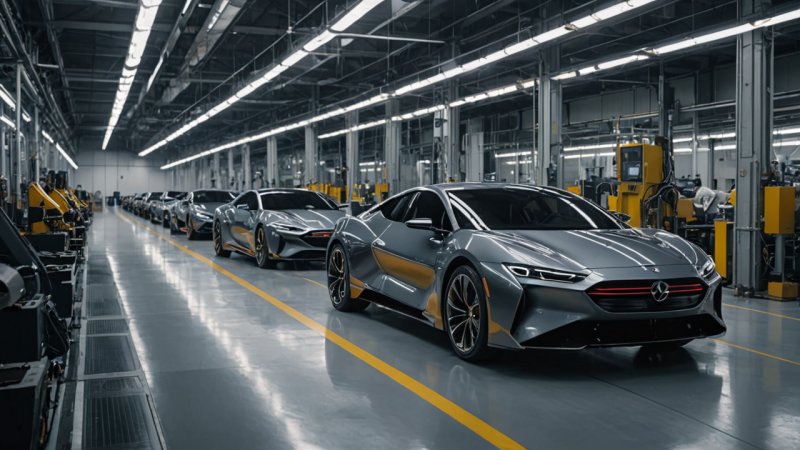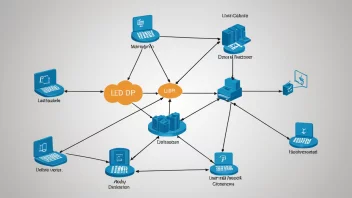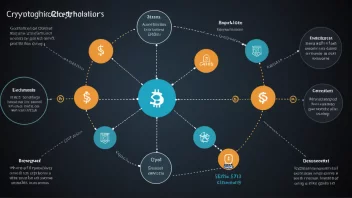The automotive industry is undergoing a significant transformation, driven by advancements in technology and an increasing focus on sustainability and efficiency. Among these technologies, blockchain stands out for its potential to revolutionize various aspects of automotive operations, from manufacturing and supply chain management to customer engagement and vehicle history tracking. This article will compare the traditional automotive processes with blockchain implementation to highlight their strengths and weaknesses, providing insights into how blockchain can enhance the automotive sector.
Traditional Automotive Processes
Before diving into blockchain's potential, it's essential to understand the traditional automotive processes that have long governed the industry. These processes include manufacturing, supply chain management, vehicle registration, and customer interaction.
Manufacturing and Supply Chain
In traditional manufacturing, the automotive industry relies heavily on a complex network of suppliers and manufacturers. Each component, from engines to electronics, is sourced from different suppliers, requiring meticulous tracking and coordination. The supply chain is often opaque, with limited visibility into the sourcing and manufacturing stages.
- Pros: Established processes, extensive experience in production, and a well-defined supply chain.
- Cons: Lack of transparency, susceptibility to fraud, and challenges in tracing parts back to their origin.
Vehicle Registration and History Tracking
Vehicle registration and history tracking are typically managed by centralized databases maintained by government agencies and manufacturers. This system can lead to inefficiencies, such as delays in updating records and difficulties in accessing accurate vehicle history.
- Pros: Structured systems with defined regulations and standards.
- Cons: Centralization can lead to data breaches and inaccuracies due to human error.
Blockchain Implementation in the Automotive Sector
Blockchain technology offers a decentralized and secure alternative to traditional automotive processes. By leveraging blockchain, the automotive industry can enhance transparency, traceability, and efficiency.
Manufacturing and Supply Chain Transparency
Blockchain enables real-time tracking of components throughout the supply chain, allowing manufacturers to verify the origin and condition of parts. This transparency reduces the risk of fraud and improves quality control.
- Pros: Enhanced traceability, reduced fraud, and improved quality assurance.
- Cons: Initial implementation costs and the need for industry-wide collaboration.
Decentralized Vehicle Registration
Blockchain can streamline vehicle registration processes by creating a decentralized ledger that records ownership and history securely. This reduces the chances of title fraud and simplifies the transfer of ownership.
- Pros: Speedy transactions, reduced administrative overhead, and enhanced security.
- Cons: Regulatory hurdles and the challenge of integrating with existing systems.
Comparative Analysis of Traditional vs. Blockchain Approaches
Transparency and Traceability
One of the most significant differences between traditional processes and blockchain is the level of transparency. Traditional methods often suffer from a lack of visibility, while blockchain's decentralized nature ensures that every transaction is recorded and easily accessible.
| Aspect | Traditional Processes | Blockchain Implementation |
|---|---|---|
| Transparency | Limited | High |
| Traceability | Difficult | Easy |
| Fraud Risk | High | Low |
Efficiency and Speed
Blockchain also enhances efficiency in vehicle registration and supply chain management. Traditional systems may involve lengthy paperwork and delays, whereas blockchain can facilitate immediate updates and transactions.
| Aspect | Traditional Processes | Blockchain Implementation |
|---|---|---|
| Transaction Speed | Slow | Fast |
| Administrative Overhead | High | Low |
Security and Data Integrity
Data security is a critical concern in the automotive sector. Traditional databases are vulnerable to hacking and data breaches, while blockchain's cryptographic nature provides a more robust security framework.
| Aspect | Traditional Processes | Blockchain Implementation |
|---|---|---|
| Data Security | Moderate | High |
| Risk of Data Breaches | High | Low |
Challenges of Blockchain Adoption
While the benefits of blockchain in the automotive sector are clear, there are also challenges that need addressing. These include:
- Initial Costs: Implementing blockchain technology can be expensive and resource-intensive.
- Regulatory Compliance: The automotive industry is heavily regulated, making it essential to navigate legal frameworks while adopting blockchain solutions.
- Interoperability: Existing systems must be able to integrate with blockchain technology, which may require substantial changes and adaptations.
Case Studies of Blockchain in the Automotive Sector
Several companies and projects are already exploring blockchain's potential in the automotive space. For instance:
Ford and IBM
Ford partnered with IBM to create a blockchain solution that enhances supply chain transparency. This project aims to ensure that every component in their vehicles is sourced ethically and sustainably.
CarVertical
CarVertical uses blockchain to provide a secure vehicle history report, allowing consumers to verify the authenticity of vehicle data, such as mileage and accident history.
Volkswagen and the Blockchain
Volkswagen is exploring blockchain for its logistics and supply chain operations to improve efficiency and reduce costs.
Conclusion
In conclusion, the comparison between traditional automotive processes and blockchain implementation highlights the transformative potential of blockchain technology in the automotive sector. While traditional methods have served the industry well for decades, they come with inherent limitations regarding transparency, efficiency, and security. Blockchain offers a promising solution to these challenges, paving the way for more sustainable and trustworthy automotive operations. However, the successful adoption of blockchain will require collaboration across the industry, addressing regulatory hurdles, and overcoming initial implementation costs. Ultimately, as the automotive industry continues to evolve, embracing blockchain technology may be the key to unlocking its full potential.






